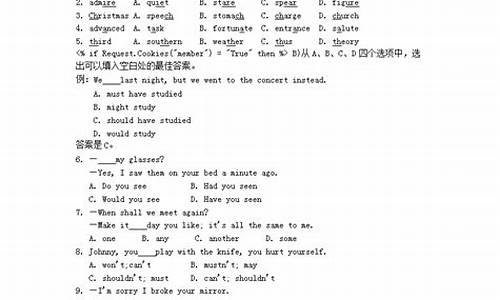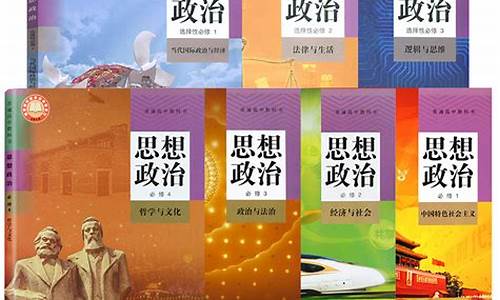您现在的位置是: 首页 > 高考调剂 高考调剂
2007年福建高考英语试卷_2006福建高考英语
tamoadmin 2024-05-29 人已围观
简介1.06年高考英语满分作文题目2.求福建2007高考考试说明成考快速报名和免费咨询: 导语福建省成人高考有英语考试,不管是专升本还是高起点,只要报考了成人高考,不管是什么层次、什么专业,都需要考《英语》。说到英语,大家都会联想到听力考试,那么福建成人高考英语考试有听力吗? 简单的来说,福建省成人高考英语考试没有听力。题目都是选择题和英文写作。以下就是福建省成人高考高升专的考试题型和内容:1、语音
1.06年高考英语满分作文题目
2.求福建2007高考考试说明

成考快速报名和免费咨询: 导语福建省成人高考有英语考试,不管是专升本还是高起点,只要报考了成人高考,不管是什么层次、什么专业,都需要考《英语》。说到英语,大家都会联想到听力考试,那么福建成人高考英语考试有听力吗?
简单的来说,福建省成人高考英语考试没有听力。题目都是选择题和英文写作。以下就是福建省成人高考高升专的考试题型和内容:
1、语音知识题目,有五道题,从划线部分选出一个和其他单词读音不同的一个,主要考查考生对单词发音的辨析能力。
2、单项选择题:从选项中选择一个正确答案填入对话中,补充完整。
3、完形填空:出题方向是,给出一篇英语短文,从中挖去一些词,然后需要考生从选项中选出正确答案,这部分虽然和单选较为相似,但是更注重考生对上下文的理解。
4、阅读理解:在每篇短文后,给出五个问题,可能是文章主旨、事件、细节考查,所以要求考生将文章大意读懂,同时不遗漏细节。
5、写作表达:出题方向可能是就一个社会现象进行议论文写作,也可能是书信写作,这道题,考生可以在考前的十天内,多背一些万能句型,最重要的是先读懂题目。
如对本文有疑惑,可在线咨询客服老师。也可扫描下方二维码,关注“猎考网”微信公众号,我们会及时更新你们想要知道的信息!
本文为原创,
成考有疑问、不知道如何总结成考考点内容、不清楚成考报名当地政策,点击底部咨询官网,免费领取复习资料: style="font-size: 18px;font-weight: bold;border-left: 4px solid #a10d00;margin: 10px 0px 15px 0px;padding: 10px 0 10px 20px;background: #f1dada;">06年高考英语满分作文题目
2008 高考口语试题
第一、二套题 回答问题
1. How do you like your school?
2. What present will you give to your mother on her birthday?
3. What present will you give to your father on his birthday?
4. What will you do to protect yourself when an earthquake broke out?
5. What should you do before leaving the lab?
6. Please say something about either of your parents.
7. Will you introduce yourself briefly?
8. Do you like traveling? Why or why not?
9. What sports do you like best? Why?
10. What do you think of your head teacher?
11. How do you improve your English?
12. Say something about your family.
第三份
1. What do you think of Sichuan earthquake?
2. Please say something about your family.
3. Where would you like to go for your holidays?
第四套:
第一份
1. Who is your favourite singer? Why?
2. How do you improve your English reading?
3. How do you like your English teacher?
第二份
1. Do you like traveling? Where have you been? Which place impressed you most? Why?
2. How do you like your school?
3. How do you improve your English listening?
第三份
1. Who is your favourite sports star? Why?
2. How do you improve your oral English?
3. Do you like your head teacher? Why or why not?
三:
( 1 ) Dinner starts with a small dish, which is often called a starter. Some people pray before they start eating, and other people may keep silent for a moment. Then you can say “Enjoy your meal” to each other and everybody starts eating. For the starter, which you eat with the smaller pair, you keep the knife in your right hand and the fork in your left. After the starter you will get a bowl of soup – but only one bowl of soup and never ask for a second serving.
The next dish is the main course. Many Westerners think the chicken breast with its tender white flesh is the best part of the bird. Some people can use their fingers when they are eating chicken or other birds, but never touch beef or the meat on bones. It is polite to finish eating everything on your plate, so don’t take more food than you need.
( 2 ) Chuck learns how to be a good friend to Wilson. Even though Wilson is just a volleyball, he becomes fond of him. He talks to him and treats him as a friend. Chuck learns that we need friends to share happiness and sorrow, and that it is important to have someone to care about. He also learns that he should have cared more about his friends. When he makes friends with Wilson, he understands that friendship is about feelings and that we must give as much as we take.
A volleyball is certainly an unusual friend. Most of our friends are human beings, but we also make friends with animals and even things. For example ,many of us have pets, and we all have favourite objects such as a lucky pen or a diary. The lesson we can learn from Chuck and all the others who have unusual friends is that friends are teachers. Friendship helps us understand who we are, why we need each other and what we can do for each other.
( 3 ) Rock and pop music are becoming more and more similar, but
Rock and pop music are becoming more and more similar, but there are still some differences. Most pop singers use the music to make money and become rich and famous. Rock singers, on the other hand, make music their life. They play music to make themselves feel better and happier. They do not think how much money they can make from a song, instead, they sing for their feelings and live for music.
Pop songs and rock songs are written in different ways. A pop song is written in a "factory" where one person writes the words, someone else writes the music, and other musicians record it. The singer often knows little about the ideas or feelings behind the song. As for rock music, however, the singers and musicians are all able to write music and work together in a band. When one of them has a strong feeling, he or she expressed it with music and the others help build the song.
四:朗读文章
(1)In 1996,Atlanta was the host of the Olympic Games, an honor the city shared with great cities such as Sydney and Beijing.
(2)Like all of us, disabled people also need inspiration and encouragement. The magazine Literature of Chinese Blind Children was started by Xu Bailun in 1985, when he decided that there should be a magazine for blind people in China. Blind children all over China read the magazine and it has inspired many of them to believe that they can realize their dreams. The articles in the magazine are often about disabled people who have overcome difficulties and learn to live a meaningful and productive life.
About one-third of the articles in Literature of Chinese Blind Children are written by disabled authors and blind children. One of the magazine’s best-known readers is Ye Zijie, who is now a teacher in Huhhot. In the year 2000, he was invited to study in London and became the first visually impaired Chinese to study abroad. Zijie says he was inspired and motivated by the magazine: “It is very important for us to know that someone far away is also struggling as we are.”
( 3 ) When we describe or talk about new inventions, we use words and ideas that we already know. For example, when we want to
When we describe or talk about new inventions, we use words and ideas that we already know. For example, when we want to explain how a computer works, we use words like “memory”, “store” and “cut and paste”. The words are useful, but they are not quite true. A computer’s “memory” is similar to human memory in some ways, but it is also very different. A computer does keep information in its memory, but that is clearly different from other kinds of storage. We do cut and paste, but we don’t use scissors or glue. Using familiar words makes it easier for us to understand and use a new tool, but it may also make it more difficult for us to use the new invention in the best way. After all, what makes a new invention such a wonderful thing is that it allows us to do something we could not do before.
Science is not just about electronics and plastic; it is also about how we think about the world. Now that we are developing new technology at such a high pace, the true challenge is to find new ways of using it. How will we use computers in the future?
第一套
(一)
1、Do you like your monitor? Why? Why not?
2、Is your English teacher strict with you in your studies? How?
3、How are you getting along with your classmates?
(二)
1、What kind of music do you like best?
2、What do you think of your English teacher?
3、Who is your best friend? Say something about him\her.
(三)
1、Do you often use dictionaries when you learn English?
2、what date is your birthday?
3、How do you like your mother?
第二套
(一)
1、Do you often play football/table tennis/volleyball/ Why? Why not?
2、Which do you like better,watching TV or seeing movies?
3、Please say something about your family.
(二)
1、Do you enjoy music? Why? Why not?
2、What's your favourite subject?
3、What do you often do on Sundays?
(三)
1、Do you buy any presents for your parents on their birthdays?
2、What sport do you like best?
3、What are you going to do during summer holidays?
第三套
(一)
1、 Do you often listen to English programs? Why? Why not?
2、What do you do in your spare time?
3、Do you like your school? Why? Why not?
(二)
1、Do you often watch TV? Why? Why not?
2、What are you going to be in the future?
3、Who is your favourite teacher? Please say something about him/her.
(三)
1、How do you usually spend your weekends?
2、Do you have any penfriends? Please say something about him/her?
3、What do you usually do in your spare time?
第四套
(一)
1、Do you like sports? Why? Why not?
2、What did you do after the collage entrance examinations?
3、Please say something about one of your good friends.
(二)
1、Do you think collecting stamps interesting? Why? Why not?
2、What subjects did you study?
3、What do you do to improve your English?
(三)
1、What's your favourite food?
2、How long did you spend on your homework every day?
3、Could you please say something about your school?
第五套
(一)
1、Is it important to learn English? Why? Why not?
2、How many classed did you have in Senior Three every day?
3、What do you do to keep fit?
(二)
1、Do you like English? Why? Why not?
2、How are you getting along with your school life?
3、Who is your favourite teacher? Please say something about him/her.
(三)
1、What subject do you like best? Why?
2、How often do you watch TV?
3、Wh第一套
第一份
1、Why do you study English?
2、Which season do you like best? Why?
3、What are your parents?
第二份
1、How do you learn English?
2、Which subject do you like best? Why?
3、How will you spend your summer holidays?
第三份
1、Do you like English? Why?
2、How do your parents celebrate your birthday?
3、Is your hometown beautiful? Say something about your hometown.
第二套
第一份
1、When will the 29th Olympic Games be held in Beijing?
2、Do you celebrate your birthday? How ?
3、What‘s your favourite food? Why?
第二份
1、What do you usually do for your holiday?
2、What do you think you can do for the disabled people?
3、How do you spend your spare time?
第三份
1、Do you like playing computer games? Why? Why not?
2、Is the computer useful in our daily life? Please give some examples. 3、Say something about your hobby, please.
at's your interest? Please say something about it?
第三套
第一份
1、Do you think spoken English is important? Why? Why not?
2、What‘s your favorite subject?
3、How do you usually celebrate your parents‘ birthday?
第二份
1、How do you like your Chinese teacher?
2、How do you usually celebrate your birthday?
3、Do you often do something good for your class? How?
第三份
1、How much time do you spend on English reading everyday?
2、What does your father do?
3、Is the city/village where you are living beautiful?
第四套
第一份
1、What‘s your favorite sport? Why/Why not?
2、How many classes are there in your school?
3、Are you good at English?
第二份
1、Which is your favorite university?
2、What subject are you good at?
3、Could you tell me something about your family?
第三份
1、How often do you go to see a film/ 2、How far is it from your home to your school?
3、Do you often help do housework?
第五套
第一份
1、What is your favorite subject? Why?
2、How do you usually spend your weekends?
3、What do you think of your school? Please describe it.
第二份
1、How do you usually celebrate your birthday?
2、Do you want to take English as your major? Why? Why not?
3、Can you tell us something about your English teacher?
第三份
1、Do you often ask your English teacher questions? Why/ Why not?
2、How can you improve your spoken English?
3、Would you please give a brief introduction of your family?
第六套
第一份
1、How do you find your English teacher?
2、Do you love music? Why/Why not?
3.Which university do you like best? Why?
第二份
1、Do you often watch TV at home? Which channel?/Why not?
2、How do you usually spend your weekends?
3、What are you going to be in the future?
第三份
1、Do you love your hometown?Why?/ Why not?
2、What is your favorite sport?
3、What do you often do in your spare time?
第一套
I、
1、Do you like music? Why/Why not?
2、What subject do you like best? Why?
3、Why do you learn spoken English?
II、
1、Do you like spoken English? Why/Why not?
2、Do you listen to music while you are studying?Why/Why not?
3、What will you do if you have a lot of money?
III、
1、Do you think friends are important to you? Why/Why not?
2、Please say sth about one of your best friends.
3、What TV programme do you like best? Why?
第二套
I、
1、Do you often watch TV? Why/Why not?
2、What are your hobbies? Please say sth about them.
3、How do you celebrate your birthday?
II、
1、How do you spend your weekends?
2、What‘s your favourite sport? Why?
3、Do you think money is very important to you?
III、
1、Do you think friendship is important to you? Why/Why not?
2、What is your favorite food? Why?
3、Do you like animals? Why/Why not?
第三套
I、
1、Please say sth about your hometown.
2、Do you often play computer games? Why/Why not?
3、What is your favorite university?Why?
II、
1、How do you spend your spare time?
2、Please say sth about one of your good friends
3、Do you love your school? Why/Why not?
III、
1、Do you like to have a part-time job?Why/Why not?
2、How do you find your English teacher?
3.What is your favorite subject?Why?
第四套
I、
1、How do you practise your spoken English?
2、Do you remember your parents‘ birthday?How do you celebrate them?
3、What season do you like best?Why?
II、
1、Would you please introduce your family?
2、Do you like fast food?Why/Why not?
3、Do you think friendship is important to you?Why/Why not?
III、
1、Do you share your feelings with your friends?Why/Why not?
2、Are you ready to help others?Why/Why not?
3、How do you improve your spoken English?
第五套
I、
1、Do you keep any pets?Why/Why not?
2、How will you spend your holidays this summer?
3、Do you like traveling?Why/Why not?
II、
1、How do you spend your pocket money?
2、Where would you like to travel?Why?
3、Do you think that good memory is important in learning English?Why/Why not?
III、
1、What kind of music do you like?
2、What do you do to improve your English?
3、Say sth about your hobby,please.
就只找到这些 希望对你有帮助
求福建2007高考考试说明
- 上海高考优秀作文选登:我想握住你的手
2006年广东高考优秀作文:我是天使
2006年广东高考优秀作文:心有天使,诗意人生
- 2006年广东高考优秀作文:用爱雕琢心中的天使
- 2006年福建高考优秀作文:山的那边
- 2006年福建高考优秀作文:戈多来临,请关好门窗
- 2006年福建高考优秀作文:箭锋上的友情
- 2006年福建高考优秀作文:那人却在灯火阑珊处
- 2006年福建高考优秀作文:拒绝空白
- 2006年福建高考优秀作文:空白中的独舞
- 2006年福建高考优秀作文:抓住根本看轻其余
- 2006年江苏高考优秀作文选登:人与路
- 2006年江苏高考优秀作文选登:用生命去体会
- 2006年江苏高考优秀作文选登:这条路满是眼泪
2006年江苏高考优秀作文选登:作文恰如行路
2006年江苏高考优秀作文选登:我是人形的鸟
2006年山东高考优秀作文:眺望
2006年山东高考优秀作文:窗棂边的栀子花
2006年山东高考优秀作文:梦想在现实中起舞
2006年山东高考优秀作文:相遇在梦想与现实的轨迹中
2006年山东高考优秀作文:守望遥远·我们的天堂
2006年山东高考优秀作文:遥望晶莹 近观纤瑕
2006年山东高考优秀作文:美,距离的忧伤
2006年江苏高考优秀作文:人与路
湖南2006年高考满分作文选登:“谈意气”
湖南2006年高考满分作文选登:“谈意气”
湖南2006年高考满分作文选登:“谈意气”
湖南2006年高考满分作文选登:“谈意气”
北京满分作文:北京的符号――老舍与北京
来自省教育部门的消息称,2007年我省仍将实行高考语文、数学、英语三科自行命题,文科综合能力测试、理科综合能力测试和外语中其他语种的考试,仍然使用全国统一命题的试卷。
2007年的考试说明和去年变化不大,仅在出题技巧和考题形式设计等方面出现微小的变化,更加体现与课改的接轨。同时,2007年的考试说明中附有题例和参考试卷。
结合对师大附中等学校高三一线老师的采访,记者将2007年考试说明中的特点予以整理,供考生参考。
语文
《教学大纲》推荐阅读的名著列入考试范围
文言文阅读出自《论语》《孟子》《庄子》
写作突出16个评分点之一即可拿下20分
命题要求:根据语文学科的特点,进行考试内容的改革。语言基础知识结合在阅读、语言应用与写作中检测。应注重语文积累、语文基本功和综合运用能力的考查。命题选用的材料语言要规范优美,要有文化含量,要有时代气息,要有理趣和情趣,创设一种宽松愉悦的考试环境,激发学生学习语文的兴趣。试题要注意引导高中学生明确语文应该学什么,怎么学,发挥高考对中学语文教学良好的导向作用。《教学大纲》推荐课外阅读的长篇小说类文学名著列入考试范围。从《教学大纲》推荐课外阅读的三部文化经典著作(《论语》《孟子》《庄子》)中,选取文章作为第II卷文言文阅读考查的材料,目的在于引导学生重视优秀文化遗产的传承,提高文化素养。名句名篇默写取材于《教学大纲》和现行教材规定背诵的篇目。
试卷难度:难度值(P值)约为0.6。
考试形式与结构:试卷满分为150分。考试限定用时为150分钟。
试题类型:选择题、填空题、古文翻译题、简答题、写作题。
考试内容:第I卷(选择题,共21分)其中,社会科学类文章阅读6分;自然科学类文章阅读6分;文言文阅读9分。第II卷(共129分),其中文化经典著作阅读10分;古诗鉴赏6分;名句名篇默写6分;文学名著阅读10分,现代文学作品阅读(17分);表达应用10分;写作70分。作文评分采用“基础等级”和“发展等级”两级评分标准。基础等级占50分,发展等级占20分。需要说明的是,发展等级有四个项共16个评分点(透过现象深入本质,揭示事物内在的因果关系,观点具有启发性;材料丰富,论据充实,形象丰满,意境深远;用词贴切,句式灵活,善于运用修辞手法,文句有表现力;见解新颖,材料新鲜,构思新巧,推理想象有独到之处,有个性色彩),采用一点评分法,即以16点中最突出的一点来评分,这一点该得到多少分就得多少分。换言之,有一点突出就可以得到满分20分。
三大变化:福建师大附中薛章辉老师告诉记者,2007年的高考说明和去年相比,最大的变化就是主观题分数增加,客观题分数减少。客观题从去年的36分减少到2007年的21分,主观题则从去年的114分增加到129分。同时,2007年不考断句,增加了文化经典的考试内容和中外文学名著的考试内容。中外名著有11本,为《三国演义》、《红楼梦》、《子夜》、《复活》、《老人与海》等。
数学
设置适当开放性、探索性试题,鼓励有创造性答案
控制试卷长度、卷面字数和计算量,增加思考时间
难度以中档题为主,易、中、难比例约为3:5:2
命题要求:对数学基础知识的考查,要求既要全面,又要突出重点。对于支撑数学知识体系的主干内容——函数与导数、数列、不等式、三角函数、立体几何、解析几何、概率,占有较大的比例,构成数学试卷的主体。同时,淡化特殊技巧,强调数学思想和方法的原则。对考生运算能力的考查主要是以含字母的式的运算为主,同时要兼顾算理和逻辑推理的考查。坚持数学应用,考查应用意识的原则。高考中可设置适当开放性、探索性试题,鼓励有创造性的答案,考查考生创新意识和探究的精神。控制试卷长度、卷面字数和计算量。要控制考生答卷的书写时间,可以充分利用选择题、填空题书写答案简便的特点,尽量增加考生的思考时间。高考以考查能力素质为主,试题应尽量避免繁、难的运算,控制各题的计算量,排除由于计算过多过繁造成耗时较多,或由计算错误而造成全题失分的现象,以便集中考查考生的各种能力。
试卷难度:高考试卷难度要适中,既要使一般考生都能得到基本分,又要使优秀考生的水平得以充分显现。根据我省考生的实际情况,整卷难度应控制在0.6左右。试卷中各个试题的难度一般控制在0.2-0.8之间。试题以中档题为主,易、中、难试题的比例约为3:5:2(容易题的难度值为0.7以上,中档题的难度值为0.4-0.7,难题的难度值为0.4以下)。整个试卷中各种难度试题分数的分布也应该适当,在每种题型中都编拟一些较易难题,使大部分考生能得到一定的基本分,并在每种题型中都编拟一些有一定难度的试题,从而实现选拔的目的。
考试形式与结构:数学文科(理科)试卷均包括第I卷和第II卷,有选择题、填空题和解答题三种题型。第I卷为选择题,第II卷为非选择题。试卷满分为150分。考试限定用时为120分钟。选择题是四选一型的单项选择题;填空题只要求直接填写结果,不必写出计算步骤或论证过程。以上两种题型的试题,均不给中间分。解答题包括计算题、证明题和应用题等,解答应写出文字说明、演算步骤或推证过程。选择题共12题,每题5分,共计60分;填空题共4题,每题4分,共计16分;解答题共6题,共计74分。
三大变化:在三角函数部分,将考试要求中的“(1)理解任意角的概念、弧度的意义。能正确地进行弧度与角度的换算”改为“(1)了解任意角的概念、弧度的意义。能正确地进行弧度与角度的换算”。在三角函数部分,将考试要求中的“(2)掌握任意角的正弦、余弦、正切的定义。了解余切、正割、余割的定义。掌握同角三角函数的基本关系式。掌握正弦、余弦的诱导公式。了解周期函数与最小正周期的意义”改为“(2)理解任意角的正弦、余弦、正切的定义。了解余切、正割、余割的定义。掌握同角三角函数的基本关系式。掌握正弦、余弦的诱导公式。了解周期函数与最小正周期的意义。”在9(A)和9(B)直线、平面、简单几何体部分,将考试要求中的“(1)掌握平面的基本性质,会用斜二测的画法画水平放置的平面图形的直观图。能够画出空间两条直线、直线和平面的各种位置关系的图形。能够根据图形想象它们的位置关系”改为“(1)理解平面的基本性质,会用斜二测的画法画水平放置的平面图形的直观图。能够画出空间两条直线、直线和平面的各种位置关系的图形。能够根据图形想象它们的位置关系。”
英语
难度以中档题为主,易、中、难比例约为3:5:2
仍采用含听力测试题(占30分)的考试形式
写作命题以考生的认知水平和生活经验为基础
命题要求:单项填空要求强调语法和词汇知识在特定语境中的应用和情景理解。命题要特别注意语用和情景理解的设置,并保证主干知识的覆盖面,增加综合性和语境化因素。完形填空考查考生的阅读理解能力和对词汇的综合运用能力,是能较好拉开考生档次的区分度很强的题型。所选语言材料要有利于考生进行语篇分析,要保证本大题有较好的区分度。阅读理解部分要求是《教学大纲》的重点。所选语言材料应力求题材丰富、体裁多样、语言地道,并且能够贴近社会、贴近时代、贴近生活;阅读题的词汇量(含题干与备选答案)不宜太少;试题设计要切中要点。短文改错考查考生在语篇中综合运用英语的准确性。所选材料应力求贴近考生生活和学习实际,反映学生在书面交际中的常见错误。书面表达考查学生用书面形式表达思想、情感和传递信息的交际能力。命题题材应以考生的认知水平和生活经验为基础,有利于考生体验、实践英语语言的特点、技巧和规律。
试卷难度:根据《考试大纲》规定,我省高中发展和高校招生的实际情况以及实施高中新课程的要求,英语科试卷的难度值约为0.55-0.6之间。试题以中档题为主,易、中、难试题的比例约为3:5:2(容易题的难度值为0.7以上,中档题的难度值为0.5-0.7,难题的难度值为0.3-0.5)。
考试形式与结构:2007年我省仍采用含听力测试题(分数占全卷20%)的考试形式。听力部分的试题采用全国卷,其他部分试题由我省自行命题。全卷满分为150分,考试限定用时为120分钟。试卷结构:试卷由第一卷和第二卷两部分组成。第一卷包括第一、二、三部分,为选择题。第二卷即第四部分,为非选择题。
考试内容:分为听力、英语知识运用、阅读理解、写作四大部分。
第一部分:听力
本部分共两节,测试学生理解英语口语的能力。
第一节:共5小题,每小题1.5分。要求考生根据所听到的5段简短对话,从每题所给的3个选项中选出最佳选项。每段录音材料仅读一遍。
第二节:共15小题,每小题1.5分。要求考生根据所听到的5段对话或独白,从每题所给的3个选项中选出最佳选项。每段录音材料读两遍。
听力考试进行时,考生将答案标在试卷上;听力部分结束后,考生有两分钟的时间将试卷上的答案转涂到答题卡上。本部分所需时间约为20分钟。
第二部分:英语知识运用
本部分共两节,测试考生对英语语法、词汇知识和简单表达形式的掌握情况。
第一节:共15小题,每小题1分。每题在一句或两句话中留出空白,要求考生从每题所给的4个选项中选出最佳选项。
第二节:共20小题,每小题1.5分。在一篇200至250词的短文中留出20个空白,要求考生从每题所给的4个选项中选出最佳选项,使补足后的短文意思通顺、前后连贯、结构完整。
本部分所需时间约为25分钟。
第三部分:阅读理解
测试考生阅读理解书面英语的能力。
共20小题,每小题2分。要求考生根据所提供短文的内容(不少于1000词),从每题所给的4个选项中选出最佳选项。本部分所需时间约为35分钟。
第四部分:写作
本部分共两节,测试考生的书面表达能力。
第一节:共10小题,每小题1分。本题给出一篇约100个单词的短文,要求考生对标有题号的每一行作出判断,如有错将其改正。错误类型包括词法、句法、行文逻辑等。
第二节:满分25分。要求考生根据所给情景,用英语写一篇100个单词左右的短文。情景包括目的、对象、时间、地点、内容等;提供情景的形式有图画、图表、提纲等。本部分所需时间约为40分钟。









